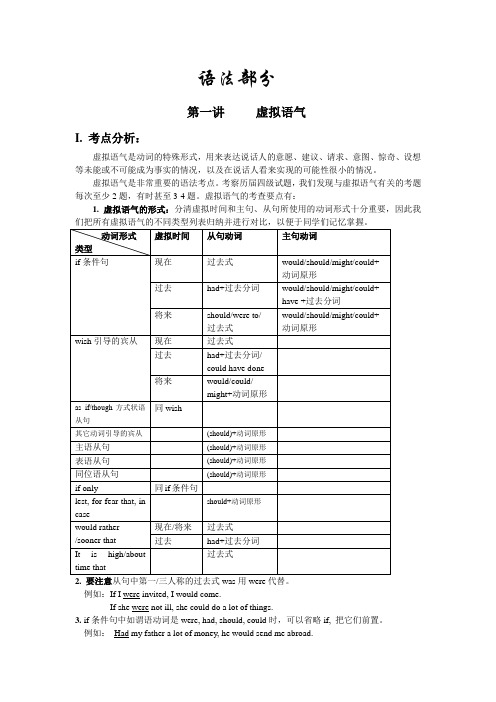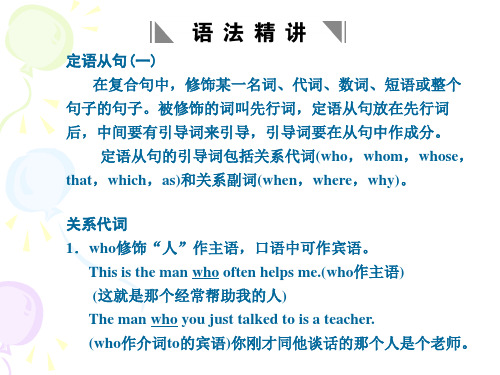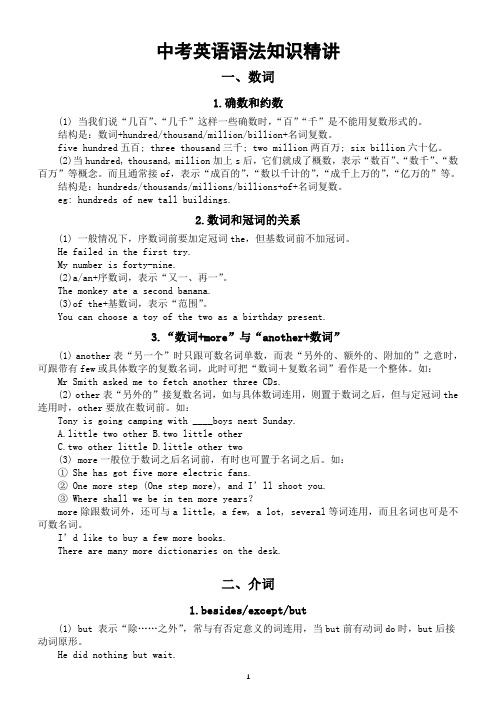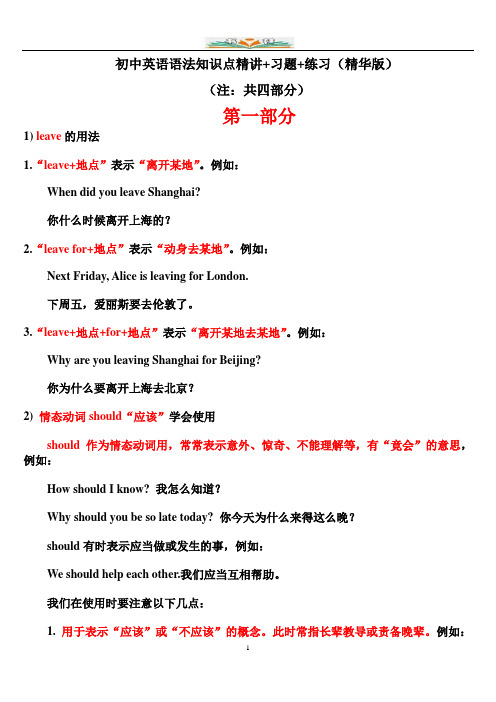英语语法精讲
英语语法精讲多练(英语语法一本通)附答案

【考试内容概述】第一节词类(冠词、名词、代词、数词)【冠词内容讲解】1.不定冠词a/an用法2.定冠词the的用法3.零冠词1.不定冠词 a / an用在单数名词之前,表示某一类人或事物的“一个”。
表示个别或泛指的用法:【例1】How about taking _____ short break? I want to make _____call.A.the; aB.a; theC.the; theD.a; a『正确答案』D『答案解析』take a short break“休息一会儿”,make a call“打一个电话”。
【例2】Christmas is _____ special holiday when _____ whole family are supposed to get together.A.the; theB.a; aC.the; aD.a; the『正确答案』D『答案解析』a special holiday指“某一个特别的节日”;the whole family为特指。
注意:不定冠词还可用于固定短语中,在这些固定短语中,a 是不可缺少的一部分。
例如:have a seat 坐下in a hurry匆忙地have a good time 玩得开心have a cold /fever 感冒/发烧不定冠词还可以用在具体化的抽象名词前【例题】—How about _____ Christmas evening party?—I should say it was _____ success.A.a; aB.the; aC.a; 不填D.the; 不填『正确答案』B『答案解析』the Christmas evening party为特指刚结束的圣诞晚会;a success考查抽象名词具体化时的不定冠词用法。
success原为抽象名词,不可数,但在此处已经完全具体化而变为可数名词。
题中a success意为“一次成功的晚会”。
大学英语语法精讲【重点、考点全涵盖】

语法部分第一讲虚拟语气I. 考点分析:虚拟语气是动词的特殊形式,用来表达说话人的意愿、建议、请求、意图、惊奇、设想等未能或不可能成为事实的情况,以及在说话人看来实现的可能性很小的情况。
虚拟语气是非常重要的语法考点。
考察历届四级试题,我们发现与虚拟语气有关的考题每次至少2题,有时甚至3-4题。
虚拟语气的考查要点有:1. 虚拟语气的形式:分清虚拟时间和主句、从句所使用的动词形式十分重要,因此我2. 要注意从句中第一/三人称的过去式was用were代替。
例如:If I were invited, I would come.If she were not ill, she could do a lot of things.3. if条件句中如谓语动词是were, had, should, could时,可以省略if, 把它们前置。
例如:Had my father a lot of money, he would send me abroad.Could I do it, I would surely do it.Should the Black Death reappear, what should we do?(万一黑死病再次出现,我们该怎么办?)4. 错综时间的条件句是难点,如99年1月第60题: If I hadn’t stood under the ladder to catch you when you fell, you wouldn’t be smiling now.(从句用过去完成时,主句用现在进行时)又如:If I were you, I would have gone to the film last night.(从句虚拟现在,主句虚拟过去);If we hadn’t got everything ready by now, we should be having a terrible time tomorrow.(从句虚拟过去,主句虚拟将来);If the weather had been more favorable, the crops would be growing still better.(从句虚拟过去,主句虚拟现在)5. 虚拟句的另一难点是省略if条件句的含蓄条件句,如:I would have written the paper before, but I have been ill.(=If I had not been ill, I would have written the paper before.);A true friend would have acted differently. (=A friend, if he had been true, would have acted differently.)6. 注意介词短语without, but for, in the absence等表示虚拟条件。
专升本英语语法精讲

2.定语从句中用that不用which情况 (1)先行词是序数词或被序数词、形容词最高级以及the very,the only修饰。
This is the first film that I have seen at this cinema. 这是我在这个剧院看的第一部电影。 (2)先行词为不定代词all,one,none,anything, everything,nothing,little,much,few等或被much, little,just,few,no,any,every等所修饰。 He has little time that he can spare.他一点时间也抽不出。 Is there anything that I can do for you? 有什么需要我帮忙的吗? (3)当定语从句的先行词包括人或物时。
5.which (1)修饰“物”作主语、宾语。 The building which stands near the river is our school. 耸立在河旁边的那幢房子是我们的学校。 (2)修饰句子中的短语、整个句子,作主语、宾语,常引导一非限 制性定语从句,有时可插在句中。 I have to work on Sunday,which I don’t like. 我星期天得上班,这点我不喜欢。 They tried to catch the bird,which was impossible. 他们想抓住那只鸟,而这是不可能的。 (3)修饰一短语、句子时,也可作定语,使句子更加明确。 He came back late,by which time all the guests had already left. 他回来迟了,到那个时候所有的客人都已经走了。 I was told to go not by train but by bus,which advice I followed. 有人告诉我不要乘火车而乘汽车,我听从了此建议。
高考英语语法精讲之句子结构分析课件(共19张)

练习English-Chinese
• 3. In the video, young people from 20 countries along the Belt and Road (一带一 路) routes were asked to name great inventions that had influenced their lives i在n 这Ch个in视a.频(中高,)来自沿着一带一路路线的20 多个国家的年轻人被要求列举出影响了他们 在中国生活的伟大发明。
Angelababy. • The beautiful girl slim enough is Angelababy. • The question whether the beautiful girl is Angelababy has an answer.
1.已经存在的形容词放在名词前面 2.人为创造的形容词放在名词后面
练习English-Chinese
• 2. People’s knowledge and ideas about Scotsman wearing these funny kilts come from films and television.(高)
人们关于穿着滑稽短裙的苏格 兰人的知识和见解来自电影和 电视。
左二右六原则
限定词 形容词
核心名词
1.不定式
2.分词 3.介词短
语
4.定语从句
to do
过去分词:done 现在分词: doing5.形来自词短 语6.同位语从句
什么叫做限定词?
•语法:限定词是指在名词词组中对中心名词起 特指,类指及表示确定数量和非确定数量作用 的名词。 ①冠词:a、an、the ②形容词性代词:my、your、his、her、its、 their… ③量词:a number of、plenty of、some…
初中英语中考复习语法知识精讲(数词+介词+连词)

中考英语语法知识精讲一、数词1.确数和约数(1) 当我们说“几百”、“几千”这样一些确数时,“百”“千”是不能用复数形式的。
结构是:数词+hundred/thousand/million/billion+名词复数。
five hundred五百; three thousand三千; two million两百万; six billion六十亿。
(2)当hundred, thousand, million加上s后,它们就成了概数,表示“数百”、“数千”、“数百万”等概念。
而且通常接of,表示“成百的”,“数以千计的”,“成千上万的”,“亿万的”等。
结构是:hundreds/thousands/millions/billions+of+名词复数。
eg: hundreds of new tall buildings.2.数词和冠词的关系(1) 一般情况下,序数词前要加定冠词the,但基数词前不加冠词。
He failed in the first try.My number is forty-nine.(2)a/an+序数词,表示“又一、再一”。
The monkey ate a second banana.(3)of the+基数词,表示“范围”。
You can choose a toy of the two as a birthday present.3.“数词+more”与“another+数词”(1) another表“另一个”时只跟可数名词单数,而表“另外的、额外的、附加的”之意时,可跟带有few或具体数字的复数名词,此时可把“数词+复数名词”看作是一个整体。
如:Mr Smith asked me to fetch another three CDs.(2) other表“另外的”接复数名词,如与具体数词连用,则置于数词之后,但与定冠词the 连用时,other要放在数词前。
如:Tony is going camping with ____boys next Sunday.A.little two otherB.two little otherC.two other littleD.little other two(3) more一般位于数词之后名词前,有时也可置于名词之后。
初中英语语法知识点精讲+习题+练习(精华版).doc

初中英语语法知识点精讲+习题+练习(精华版)(注:共四部分)第一部分1) leave的用法1.“leave+地点”表示“离开某地”。
例如:When did you leave Shanghai?你什么时候离开上海的?2.“leave for+地点”表示“动身去某地”。
例如:Next Friday, Alice is leaving for London.下周五,爱丽斯要去伦敦了。
3.“leave+地点+for+地点”表示“离开某地去某地”。
例如:Why are you leaving Shanghai for Beijing?你为什么要离开上海去北京?2) 情态动词should“应该”学会使用should作为情态动词用,常常表示意外、惊奇、不能理解等,有“竟会”的意思,例如:How should I know? 我怎么知道?Why should you be so late today? 你今天为什么来得这么晚?should有时表示应当做或发生的事,例如:We should help each other.我们应当互相帮助。
我们在使用时要注意以下几点:1. 用于表示“应该”或“不应该”的概念。
此时常指长辈教导或责备晚辈。
例如:You should be here with clean hands. 你应该把手洗干净了再来。
2. 用于提出意见劝导别人。
例如:You should go to the doctor if you feel ill. 如果你感觉不舒服,你最好去看医生。
3.用于表示可能性。
should的这一用法是考试中常常出现的考点之一。
例如:We should arrive by supper time. 我们在晚饭前就能到了。
She should be here any moment. 她随时都可能来。
3) What...? 与Which...?1. what 与which 都是疑问代词,都可以指人或事物,但是what仅用来询问职业。
译林版高中英语必修第1册 语法精讲①
(2)谓语(predicate) 谓语用来说明主语所做的动作或主语的特征状态,由行为动词的时 态、语态充当。 ❻He succeeded at last by working hard. 他通过努力工作最后成功了。 ❼He didn't focus his attention on his study last night. 昨天晚上他没有专心学习。 ❽He runs every morning.他每天早上跑步。 ❾The film is interesting.这部电影很有趣。
要发挥潜能,你得努力。(目的状语)
(7)宾语补足语(object complement):位于宾语后,用来补充宾语的
意义。由名词、形容词、副词、介词短语、不定式、现在分词、过去
分词等充当。
○28 Has he found himself a place to live yet?
他找到地方住了吗?(名词)
(3)宾语(object):宾语表示动作的对象或行为的承受者,一般位于及 物动词(短语)或介词后面,有的动词后面有两个宾语——间接宾语(人) 和直接宾语(物)。可作宾语的词通常有名词、代词、doing、 to do或 者宾语从句。
⑩He loves English.他喜欢英语。 ⑪His teacher praised him for his courage to take up the challenge. 他的老师表扬他接受挑战的勇气。 ⑫He enjoys reading some books.他喜欢看书。 ⑬I don't know whether I can make a difference to these boys. 我不知道会不会对这些男孩产生影响。 ⑭
高中英语语法-名词性从句精讲(共73张PPT)
Whoever wants the book may have it. I’ll do whatever I can to help him. Buy whichever is cheapest.
连接副词 when, where, how, why
when • When they will start is unknown yet. where • Where she has gone is a mystery. how • How this happened is not clear. why • Why he did that wasn’t quite unclear.
主语从句关联词 连词 that, whether 连接代词 what, who, whom, which 连接副词 when, where, how, why
连词 that, whether
只起连接作用 在从句中不充当任何句子成分
• That he will win is certain.
• It has been reported that sales of beef in China will increase.
宾语从句关联词 连词 that, whether; if 连接代词 what, who, whom, whose, which 连接副词 when, where, how, why
• I doubt _______ he will come soon. • I do not doubt _____ he will come soon. • Do you doubt _____ he will come soon?
• what surprised me was what he said.
(完整word版)高一英语语法(全)讲义精讲
高一英语语法讲义一、句子成分及简单句五种基本句型一、句子成分(一)句子成分的定义:构成句子的各个部分叫做句子成分。
句子成分有主要成分和次要成分;主要成分有主语和谓语;次要成分有表语、宾语、定语、状语、补足语和同位语。
(二)主语:主语是一个句子所叙述的主体,一般位于句首。
但在there be结构、疑问句(当主语不是疑问词时)和倒装句中,主语位于谓语、助动词或情态动词后面。
主语可由名词、代词、数词、不定式、动名词、名词化的形容词和主语从句等表示。
例如:During the 1990s, American country music has become mo re and more popular.(名词)We often speak English in class.(代词)One-third of the students in this class are girls.(数词)To swim in the river is a great pleasure.(不定式)Sm oking does harm to the health.(动名词)The ri ch should help the poor.(名词化的形容词)When we are going to have an English test has not been decided.(主语从句)It is necessary to master a foreign language.(it作形式主语,真正的主语为后面的不定式)(三)谓语:谓语说明主语所做的动作或具有的特征和状态。
动词在句中作谓语,一般放在主语之后。
谓语的构成如下:1、简单谓语:由一个动词或动词短语构成。
如:He practices running every morning.2、复合谓语:(1)由情态动词或其他助动词加动词原形构成。
如:You may keep the book for two weeks. He has caught a bad cold. (2)由系动词加表语构成。
专升本英语语法知识点精讲
专升本英语语法知识点精讲对于许多想要通过专升本来提升自己学历的同学来说,英语语法是必须要攻克的难关之一。
掌握好英语语法不仅能够帮助我们在考试中取得好成绩,更能为今后的英语学习打下坚实的基础。
接下来,就让我们一起深入了解一些专升本英语语法的重要知识点。
一、动词时态动词时态是英语语法中的核心内容。
在专升本考试中,常见的时态包括一般现在时、一般过去时、一般将来时、现在进行时、过去进行时、现在完成时、过去完成时和过去将来时。
1、一般现在时表示经常发生的动作、客观事实或真理。
例如:“The earth revolves s around the sun”(地球绕着太阳转。
)其构成是主语+动词原形(当主语是第三人称单数时,动词要加“s”或“es”)。
2、一般过去时用于描述过去发生的动作或状态。
比如:“I played basketball yesterday”(我昨天打篮球了。
)构成是主语+动词的过去式。
3、一般将来时表示将来要发生的动作,常见的表达有“will +动词原形”和“be going to +动词原形”。
例如:“I will go to Beijing next week” (我下周要去北京。
)4、现在进行时表示正在进行的动作,结构为“be +现在分词”。
如:“She is reading a book now”(她现在正在读书。
)5、过去进行时强调过去某个时刻正在进行的动作,“was/were +现在分词”是其构成形式。
像:“I was watching TV at 8 o'clock last night” (昨晚八点我正在看电视。
)6、现在完成时表示过去发生的动作对现在造成的影响或结果,或者从过去开始一直持续到现在的动作。
“have/has +过去分词”为其结构。
例如:“I have learned English for five years”(我学英语已经五年了。
)7、过去完成时在过去某个时间点之前已经完成的动作,由“had +过去分词”构成。
- 1、下载文档前请自行甄别文档内容的完整性,平台不提供额外的编辑、内容补充、找答案等附加服务。
- 2、"仅部分预览"的文档,不可在线预览部分如存在完整性等问题,可反馈申请退款(可完整预览的文档不适用该条件!)。
- 3、如文档侵犯您的权益,请联系客服反馈,我们会尽快为您处理(人工客服工作时间:9:00-18:30)。
现代英语语法第一部分:引言《现代英语语法》是由李基安先生编写,全国高等教育自学考试指导委员会指定的全国高等教育自学考试教材。
关于这门课程的考试要求,可参见该教程第425所附录的《英语语法自学考试大纲》。
大纲是方向、目标,广大考生必须仔细了解。
英语语法是关于英语语言结构的理论知识。
通过该课程的学习,学员能够比较系统地认识英语从词,句到语篇的构造,从而提高他们应用英语的规范性。
在学习该教材时,学员普遍存在两种倾向:一是,由于该教材都是用英文编写,里面又涉及很多专业术语,许多学员觉得高深、难懂;二是,有些学员认为,自己从学英语开始就在学习英语语法,没有必要在这门功课上花太多的精力,所有的语法书都大同小异,自己稍做准备就能对付过去。
其实,两种看法都失偏颇。
现代语法的发展与传统语法已经存在比较明显的差异,例如:传统语法认为,英语有九种(甚至十六种)时态,该教程则采取的是‘a system of two tenses and two aspects‘—-—-—-两时两体体系。
另外对phrases, clauses 的概念也有不同的定义。
书中提到的一些其他语言现象,如:外位[extraposition], 分隔[discontinuity], 分裂句[cleft sentence]等都是一般语法书所不提及或者阐述不同。
该教材也并非高深莫测,毕竟多数语言现象还是我们日常英语学习中所耳濡目染的,只不过我们许多英语学习者没有考究过它们形成的理论根据,来龙去脉而已。
所以,为了使自己的英语更加规范,让自己能用英语更准确、有效地传递信息、表达思想,英语专业的学生还是很有必要把这门课程学好。
现在我们就结合《现代英语语法》教材,近几年英语语法专业考试试题,讲述英语语法考试中考生容易忽略的测试要点或难点。
我们先通过几道语法题来检测你现有的现代语法水平,接着探讨一下该教材的学习方法,最后把教材各章的要点、难点归纳给大家。
在整个讲解过程中,我们力争多采用教材里的素材以及往年试题中的一些经典考题,以便学员在学习、归纳语法现象的同时使自己的备考收效最大化。
先测试一下自己的现代语法水平(同时了解一下英语语法考试的题型、结构;每年考试形式基本相同,有些部分稍有调整。
为了节省篇幅,这里各部分只选取几个样题)The Pre-course QuizI、单项选择题(本大题共20小题,每题1分,共20分)Choose the best answer from the choices given:1. In the end, he __________.a. got invitedb. gets invitedc. was invitedd. was to be invited2. Do what I tell you --__________!a. or elseb. or soc. and thatd. and do3. __________ , he managed to remain among the top 5% of his class.a. To work hard as he didb. Working hard as he didc. Work hard as he didd. Worked hard as he did4._____ there be life on Mars? (p171)a. Mayb. Canc. Mightd. Ought5.Stay _____ have dinner with us, will you?(p263)a. tob. orc. andd. here6.You _____ be shocked at the news.(p168)a. should wellb. must wellc. may welld. can well7. You have to wait a minute, ______?a. haven't youb. do youc. don't youd. shouldn't you8. Staying in hotel cost ________ renting a room in a dormitory for a week.a. twice as muchb. twice as much asc. as much as twiced. twice than9. I don't think she meant_________ you. (p206)a. hurtb. to hurtc. hurtingd. be hurt10. ___ I worked hard at school, I ___ this kind of work now.a. Had... wouldn't have doneb. Had... wouldn't be doingc. If... wouldn't dod. If... wouldn't be doingII.多项选择题(本大题共5小题,每题2分,共10分)Fill in the blanks with one of the items given below:a, the, any, some, all1. __________ of us decides what to take into the future and what to leave behind. That's why__________ arrival of the Year 2000 has become such a personal moment.2. be, is, was, are ,were, will be, shall be, has, have hada. She is one of these girls who _______ trouble running around.b. This one of the many houses here which _______ destroyed in the earthquake.3. seem, seems, me, I, mineYour politics _____ to be entirely different from _____. (p59)4. less, less of, than, as, likeMr. Smith is _____ a politician ______ Mr. Lee. (p237)III.填空题(本大题共20小题,每题1分,共20分)Fill in the blank with an appropriate coordinator or subordinator:1. It was an island __________ name I have forgotten.2. He carried his luggage all the way home, __________ was actually unnecessary.3. He soon made it clear __________ he had asked for a meeting.4. The police arrived, after __________ the situation became calmer.Fill in the blanks with proper words:5.I like Australia best _______ all the English-speaking countries.6.I made a comparison _______ the major English speaking countries.(p251)IV.改错题(本大题共8小题,每小题1分,共8分)Correct errors in the following sentences:1. Francis Bacon wrote that reading made a full man.2. Go and get some fresh air! You were sitting here all morning.3.The all of Paris welcomed the general. (p79)4. I've got five brothers, and every of them is quite different from the others.5. None of my parents are interested in my idea. (p344)V.改写句子(本大题共14小题,每题2分,共28分)Rewrite the following sentences as required:1. Combining the sentences into one that contains a relative clause:You sent my son an English-Chinese dictionary. Thank you very much.2. Combining the sentences into one that contains a relative clause:Twenty horses were put into the corral. They were to be trained for riding.bine the sentences into one that contains a relative clause:(p289)My boss is a very considerate person. His predecessor was not a considerate person at all. 4.Rewrite the following sentence using whatever cohesive device is appropriate:A: Is John trying to enter Harvard Law School?B: No, I don't think John is trying to enter Harvard Law School. He hates lawyers.5. Use discontinuity:Excessive exposure to violence on TV is more harmful than expected to children.VI.名词解释(本大题共2小题,每小题2分,共4分)Define the following terms with examples:1.N on-finite verbs2.D eterminersVII.简答题(本大题共5小题,每小题2分,共10分)1. What are inherent adjectives?2. Can HOW - exclamations be used to highlight the noun? If not, what can HOW - questions highlight?Key to the pre-course quizI. 单项选择题(每小题1分,共20分)1、a2、a3、b4、b5、c6、c7、c8、b9、b10、bII. 多项选择填空题(每小题2分,共10分,)1. Each, the (共2分,一格1分)2. have, were(共2分,一格1分)3. seem, mine(共2分,一格1分)4. less of, than(共2分,一格1分)III. 填空题(每题1分,共20分)1. whose2. which3. why4. which5. among6.betweenIV. 改错题(每小题1分,共8分)Correct errors in the following sentences:1. Francis Bacon wrote that reading makes a full man.2. Go and get some fresh air! You have been sitting here all morning.3.The whole of Paris welcomed the general.4. I've got five brothers, and each of them is quite different from the others.5. Neither of my parents are interested in my idea.V. 改写句子(每题2分,共28分)1. Thank you very much for the English-Chinese dictionary you sent my son.2. Twenty horses that were to be trained for riding were put into the corral.3. My boss is a very considerate person, which his predecessor was not at all.4. No, I don't think so. He hates lawyers.5. Excessive exposure to violence on TV is more harmful to children than expected.VI. 名词解释(每题2分,共4分)1. The non-finite verbs are verbs that are not marked for tense or for subject-verb concord.2. Determiners refer to words which are used in the pre-modification of a noun phrase and which typically precede any adjectives that pre-modify the head word.VII. 简答题(每小题2分,共10分)1. Generally speaking, adjectives denoting inherent qualities characterize the referent of the noun. e.g. A big house refers to a house whose size is big.2. No, they can't. They can highlight the adjectives, adverb or verb.第二部分:教材的学习与使用一.首先,仔细研读教材后面所附录的《高等教育自学考试英语语法自学考试大纲》,做到学习重点、考试要求了然于心。
